Trump’s Midwestern Meltdown
Recent poll numbers suggest that the President is vulnerable in the part of the country that assured his Electoral College victory in 2020, but Democrats are going to have to work hard to flip these states.
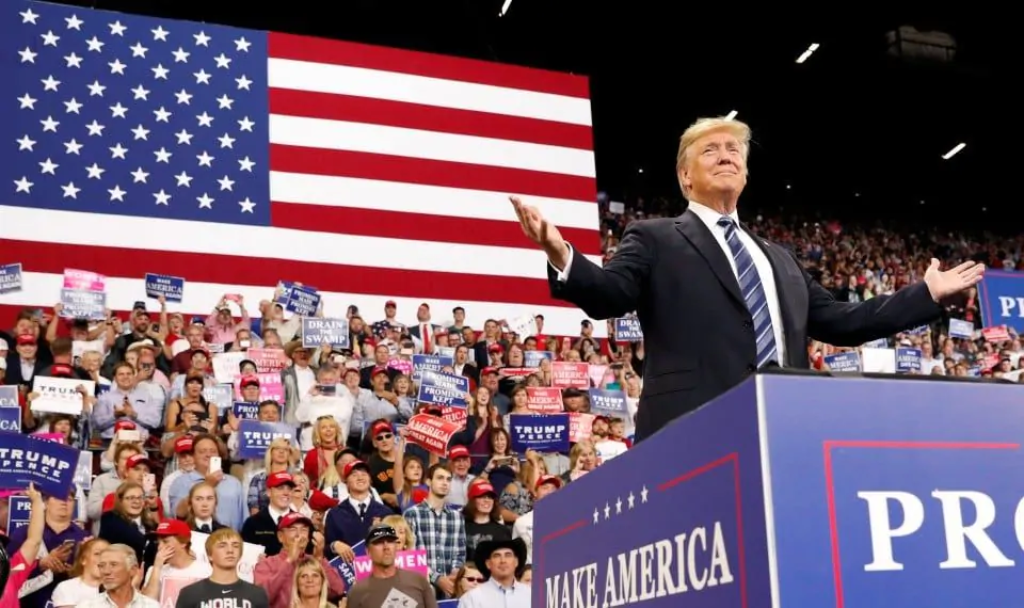
In a comment on this morning’s post about the economy and the 2020 election, regular commenter Teve brings my attention to some numbers out of the Midwest that could spell trouble for President Trump in his re-election bid.
Let’s begin with the state furthest to the west of the District of Columbia, Iowa:
- President Trump won this state, and it 6 Electoral Votes, by a fairly wide margin in 2016, beating Hillary Clinton 51.15% (800,983 votes) to 41.74% (653,669 votes);
- President Obama won this state in both 2008 and 2012, and the last time a Republican had won the state in a Presidential election was in 2004.
- According to Morning Consult, the President’s job approval in the Hawkeye State currently stands at 44% approve to 52% disapprove.
- Since taking office, the President’s net approval rating has decreased by 17 points in the Hawkeye State
Now, we’ll move to another Midwest state that the President won by a wide margin, Ohio:
- In 2016, President Trump won this state and its 18 Electoral Votes by more than eight percentage points, beating Hillary Clinton 51.69% (2,841,055 votes to 43.56% (2,394,164 votes);
- President Obama won this state in both 2008 and 2012, and the last time a Republican won the state was 2004;
- According to Morning Consult, the President’s job approval in the Buckeye State stands at 46% and his disapproval at 50%;
- Since taking office, the President’s net job approval in Ohio has fallen by 18 points.
Now we’ll move to the first of three states where the President’s margin of victory was relatively small, starting with Wisconsin:
- In 2016, the President won this state and its 10 Electoral Votes by less than one percent, beating Hillary Clinton 47.22% (1,405,284 votes) to 46.45% (1,382,536);
- President Obama won this state in both 2008 and 2012, and the last Republican to win this state was Ronald Reagan in 1984;
- According to Morning Consult, the President’s job approval in the Badger State stands at 42% while his disapproval is at 55%;
- Since taking office, the Presidents net job approval in Wisconsin has fallen by 19 percentage points.
Next up is another state that was close in 2016, Michigan:
- In 2016, President Trump won this state and its 16 Electoral Votes by another narrow margin, beating Hillary Clinton 47.50% (2,279,543 votes) to 47. 27% (2,268,839 votes);
- President Obama won this state in 2008 and 2012, and the last Republican to win this state was George H.W. Bush in 1988;
- According to Morning Consult, the President’s job approval in the Wolverine State stands at 43% while his disapproval stands at 53%;
- President Trump’s net job approval in Michigan has declined by 18 percentage points since he took office.
Finally, we can look at Pennsylvania, a state that has been described as being a hybrid of a Midwestern state and a Mid-Atlantic State;
- In 2016, President Trump won this state and its 20 Electoral Votes with 48.18% (2,970,733) votes to Hillary Clinton’s 47.46% (2,926,441 votes);
- President Obama won this state in 2008 and 2012, and the last Republican to win this state was George H.W. Bush in 1988;
- According to Morning Consult the President’s job approval in the Keystone State stands at 45% approve and 52% disapprove;
- The President’s net job approval in Ohio has declined by 17 percentage points since he took office.
You can do this with other states the President won in 2016. For example, the President’s job approval in Florida has declined 24 points since he took office, in Georgia it has declined by 15 points, and in North Carolina it has declined by 20 points. I want to concentrate on the five Midwestern states listed above, though, because they seem to represent the greatest area of regional vulnerability for the President and the area where Democrats may be best able to block the President from getting an Electoral College majority.
Taken together, these five states comprise some 70 electoral votes, more than the margin that separated Hillary Clinton from the 270 Electoral Votes she would have needed to win the election. Additionally, as I have noted in the past, in three of these states consisting of 46 Electoral Votes — Wisconsin, Michigan, and Pennsylvania — the President won by a combined total of just 77,741 votes, which represents just 0.56% of the more than 13.9 million votes cast in each of these three states combined. Without these three states, Donald Trump would not be President today.
While the correlation between job approval and the likelihood of being re-elected is debatable, especially this far from Election Day, these numbers suggest that President Trump faces a significant uphill battle in the part of the country where he defied expectations on Election Day and which gave him his margin of victory in the Electoral College over Hillary Clinton. It certainly doesn’t mean that he’s doomed in these states, of course, but it does suggest that these traditionally Democratic states are the states that Democrats should be focused on if they want to win in 2020. Their victories in the big Electoral Vote states on the coasts such as New York and California are already basically assured, as is New England and the Pacific Northwest. If Democrats are going to win in 2020, though, they are going to need to find a way to flip all, or nearly all, of these states. Right now, the numbers suggest that they have a reasonable chance of doing that, but it’s going to require them picking the right candidate for the voters in this region to convince them to cross back over and vote Democratic like they traditionally have.

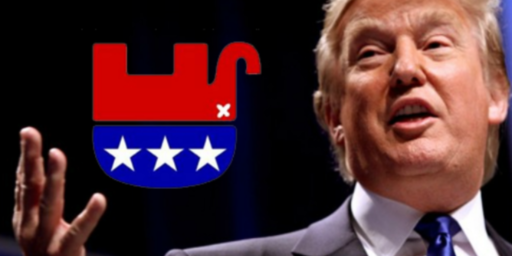
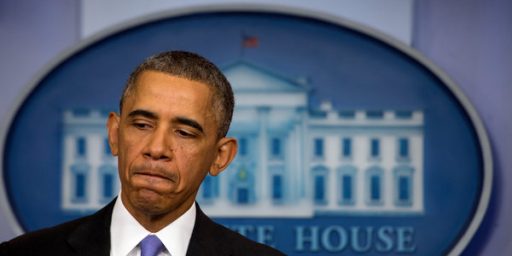
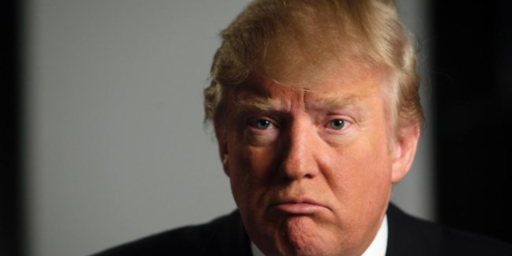
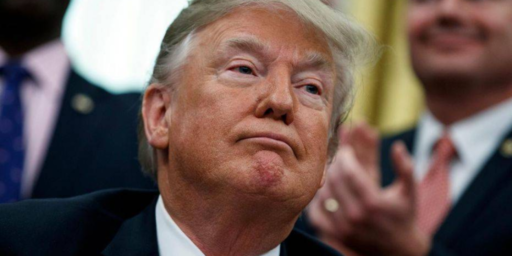
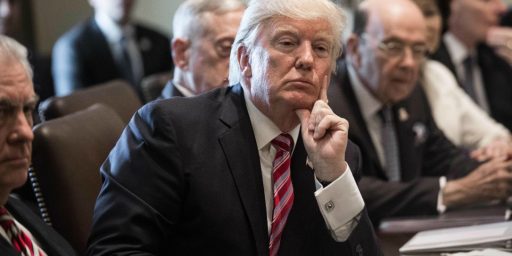
Well, specifically, they most likely need the Big Three: WI, MI, and PA. I don’t think they need IA or OH, and if they do pick up either of those states, then they’ve probably also won the Big Three as well. Indeed, given the wide margins by which Trump won IA and OH, I’d say Dems have a much better chance of making up for those losses elsewhere, particularly in Sun Belt states like AZ, FL, and NC, all of which Trump won by a much narrower margin than he won IA or OH.
But lets not keep our eyes off the ball. The Big Three are probably the must-wins. (The only other possibility is winning two of the Big Three and adding AZ or FL.) If they do that, then they’ve won the election with or without IA or OH.
I’d be interested to see what Dennison’s disapproval rating was on those states before the 2016 election.
@Kathy: Technically there’s no “approval” or “disapproval” rating for non-incumbents. Approval means job approval, which is only taken of sitting presidents.
Trump unquestionably had low favorability ratings in those states. For example, in Iowa, which Trump won by nearly 10 points, just 39% of voters rated him favorably, 59% unfavorably. (Source: CNN exit polls.) But Hillary’s ratings were barely any better, and within the margin of error: 41/57.
My sense is that Trump’s approval has stayed pretty steady at 40%. I don’t know how to reconcile that with these reported drops in states that are fairly populous. Does that mean approval has increased elsewhere? Where?
Or maybe this drop happened right after inauguration and did show up then, but has been flat ever since?
Consistent with Kylopod‘s point, I wonder whether approval means nearly as much as comparative favorability with a specific other candidate. A lot of people disapproved of Trump but hated Hillary more. The same comparison will be made with whoever faces Trump in 2020.
@Jay L Gischer: Morning Consult shows there’s been a definite drop in his approval in most states since he took office, though it hasn’t changed much since early 2018.
One caveat is that Morning Consult is a Republican-leaning firm, and 538 gives it a B-. But it’s the only pollster that’s been consistently releasing state approval ratings since Trump took office.
@Kylopod:
If I weren’t such a pedant myself, I’d be very annoyed(*)
(*) Actually I am annoyed, but it wouldn’t be fair to act on it, given how often I do things like this myself. Just today I gave someone 20 bucks (equivalent) to get some office supplies. They told me they’d need more, so I added 10 cents. Come, $20.10 is more than $20 🙂
@Joe:
That’s what seems to have happened. The other thing which might have happened, is that people disapprove of Dennison, but vote for him because they like he displays his prejudices in the open, and acts on them openly.
@Kathy: A good chunk of the people I know who voted for Trump last election either hated Hillary more OR they were of the “what do I have to lose” mindset and thought a radical change might actually make things better for them. Of course those people know better now and generally regret their Trump vote. I do know many who picked Trump simply because Trump is an asshole/idiot and they liked that. Those were the same people who I couldn’t have a rational conversation with that involved Obama in any way. Those people are perfectly fine with the racism and all that because Trump’s “pwning them libtards”…
Small personal anecdote..
@Matt: That’s exactly how it is here, too. Fox News was very successful in “inoculating” against Hillary, and pounding the Benghazi/eeeeemails drum. Bernie, too, for that matter, with the “socialist” crap.
Interestingly enough, some of the people I’ve talked to who admit to regretting their vote for Trump like “the gay guy”. They can’t say his name, but they like him.
@Kathy: I’ve seen many people mix up the two, including myself. And I think it’s important to keep the difference in mind. Approval and favorability are closely related, but they aren’t the same, and the differences matter. In the past, presidents usually maintained slightly higher favorability than approval ratings. This was true of Obama and Bush. I guess it was due to people saying “I like/respect him even though I don’t support him.” During the Lewinsky scandal, Clinton’s favorability was significantly worse than his approval.
Trump, on the other hand, has had his approval and favorability stay virtually the same throughout his presidency. I think it’s a reflection of how polarized everything has become. You’ve got the Trump cult who answers positively to any question about Trump, and then you’ve got the rest of the country who recognize what a steaming turd he is (but who won’t necessarily come out to vote against him).
Still, there was one point when the difference between the two was noticeable: when he first entered office. For the first few weeks, his approval was significantly better than his favorability. That was his “honeymoon,” even though compared to previous presidents it would appear he had no honeymoon at all. In fact going back to when Gallup started taking approval ratings in the 1940s, Trump is the only president to have never had positive approval numbers. But there’s no question his approval ratings have dropped from where they were at the start of his presidency. Even Rasmussen admits this.
What that means for 2020 is hard to say. There have been past presidents–including Obama, Clinton, and Reagan–who had bad approval ratings the year before they were reelected. Of course, those ratings dramatically improved in the following year. I don’t think that’s ever going to happen with Trump. The question is whether there are enough voters who disapprove of him but will still vote for him (or at least fail to vote for the Democrat) to put him over the top a second time.
@Kylopod:
Yeah, I say that too after going overliteral sometimes 😉
That’s the dream (nightmares are dreams, too).
I think it will come down to how enthusiastic Dennison’s base is come election day 2020. On the one hand, he lacks any major achievements, past a tax bill that saw the wealthy get a break. And yet, the base seems to care about being given a good scare regarding immigration, and applauding and bleating Dennison’s praises for being “tough” against a manufactured “crisis.”
At some point you have to wonder, did the world lose their minds, or did I?
@Kathy: To avoid getting repetitive (as I seem to cover the same points every time this topic comes up), I think a lot of Dems are in denial over the extent to which Trump has successfully consolidated the entire GOP behind him. I don’t just mean that in an institutional sense; I mean it in the sense that his partisan support going into 2020 is a lot stronger than it was in 2016, and therefore–contrary to what is often expressed here and elsewhere–I suspect that defeating him is going to require more than simply picking off a few marginal voters in the Rust Belt. He’s starting off from a stronger position than in 2016. Sure, there are voters who did a “what the hell” roll of the dice and lived to regret it, but there are also a lot of people who didn’t vote for him the first time whom he’s won over. His initial victory may have been a fluke, but that doesn’t mean he needs another fluke to win again. The belief that he does is, I think, the biggest mistake that Dems are making.
@Kylopod:
If it’s all about turnout, then it’s all about enthusiasm. If the Democrats talk too much about how hard it will be to beat Dennison, enough voters will judge the matter to be hopeless and won’t turn out to vote.
What we shouldn’t bet on is that El Cheeto will hit a wall before 2020. He should hit one, eventually. he’s running a con, and at some point he has to fail to deliver in spectacular fashion. But we all thought that would happen in 2016.
@Jax: There is no need for quotes around socialist for Sanders. He actually is, and even has wonderful videos praising various People’s dictatorships. He actually merits the Fox labeling and smearing, you shouldn’t be a Left ideologue tribal git and pretend otherwise.
@Kathy:
I think a greater danger is treating his defeat like a foregone conclusion, so that voters won’t turn out to vote because they don’t think they need to. In other words, what happened in 2016.
Not that what you describe isn’t a danger as well. Ed Kilgore worries that Dems are so afflicted by PTSD (Post-Trump Stress Disorder), from the shock of his initial win, that as the 2020 election approaches they’ll increasingly become frozen with panic, keeping them from behaving rationally and productively.
But at least based on what I’m getting from the commenters here and on other liberal blogs, I’m still hearing a lot of complacency about Trump’s inevitable demise that sounds strikingly similar to what I was hearing in 2016.
I’m not sure the main issue is whether voters figure out he’s running a con. To some extent, a sizable chunk of the population has already figured that out–and don’t care. Moreover, voters don’t usually react to whether a president has fulfilled his promises, and when they seem to, it mostly boils down to macro factors such as the economy or whether the country is at war. “Read my lips, no new taxes” probably wouldn’t have mattered if there hadn’t been a recession. Nobody seemed to blame FDR for not fulfilling his 1932 promise to balance the budget or his 1940 promise not to send boys to fight foreign wars. Not that Trump is FDR. I’m just pointing out that whether a president is held accountable has more to do with what’s happening in the lives of ordinary voters than how much the president stuck to his specific campaign pledges. And that’s especially applicable to Trump, since so much of his support comes from people who seem to care more about symbolism than substance. And symbolism will be “good enough” for a lot of voters if they think the country is in at least okay shape.
@Kylopod:
I worry about that, too. But:
1) In part there’s a tendency to make 2016 an aberration, something that doesn’t happen in a civilized society. To make it an accident of flawed candidates. In a sane world, Clinton would have gotten 538 electoral votes, or at least it shouldn’t have been close.
2) I think there’s a sense that Dennison can’t win if more people can be persuaded to vote for the Democrat, whoever it turns out to be.
The latter is part-hopeful, part-complacent. The former is partly true. Many things had to come together for El Cheeto to win, such as the GOP awarding all delegates to whoever got the most votes in a primary, among other factors.
Lastly, I’ve said we’re lucky Dennison is lazy and incompetent. But while that’s the only thing that restrains him, it’s also the thing that keeps him mostly out of trouble. If he put his mind to it, and acted as rashly as he Tweets, and stuck to policy positions, he’d have wrecked things by now.
@lounsbury: I’ve never seen Sanders as a socialist as much as I did an older child of the counterculture. In Seattle where I grew up, these were the guys who came out of the grocery store (usually Puget Co-op) with all the trappings of rejected materialism, hopped into their Jaguar sedans, and sped off to their parents’s lakefront homes.
It seems to have worked out well for him materially.
@Jax: What’s kind of interesting is three of the Trump voters have admitted they would of voted for Sanders. Two of those are of the group that regret voting Trump. Oddly enough one says he doesn’t regret his vote for Trump but he sure doesn’t seem to have any enthusiasm to talk about Trump anymore.
The main reason cited by all three for their willingness to vote Sanders? Universal health care……
I don’t really talk politics with those people very often so I have no idea what they think of Pete or anything recent on the Democratic party side of things. I don’t intentionally talk politics with most of the Trump voters/supporters I know. I tend to stick to other subjects when having conversations with them. Some of my friends have very incompatible views on politics so we stick to what brought us together.